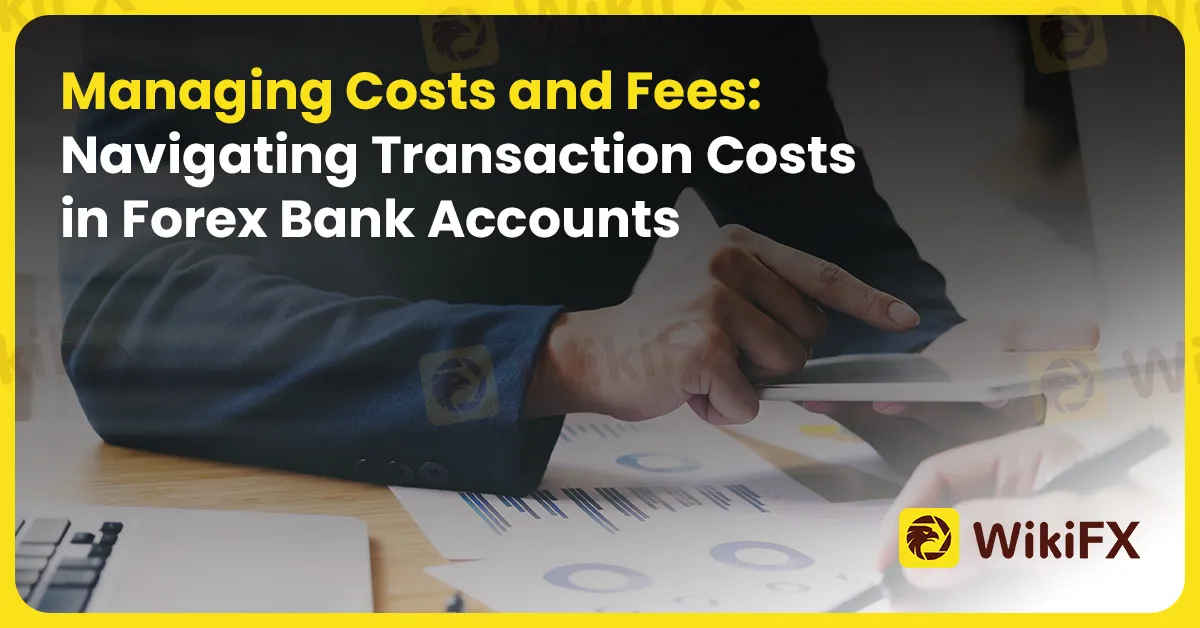简体中文
繁體中文
English
Pусский
日本語
ภาษาไทย
Tiếng Việt
Bahasa Indonesia
Español
हिन्दी
Filippiiniläinen
Français
Deutsch
Português
Türkçe
한국어
العربية
Managing Costs and Fees: Navigating Transaction Costs in Forex Bank Accounts
Abstract:When venturing into the world of forex trading, it's crucial for traders to understand and manage transaction costs and fees associated with their bank accounts. These costs can significantly impact profitability and overall trading performance, making it essential for traders to carefully evaluate and compare fee structures offered by banks in the UK and Europe. In this article, we explore the various transaction costs and fees associated with forex bank accounts and provide insights on how traders can navigate them effectively.

When venturing into the world of forex trading, it's crucial for traders to understand and manage transaction costs and fees associated with their bank accounts. These costs can significantly impact profitability and overall trading performance, making it essential for traders to carefully evaluate and compare fee structures offered by banks in the UK and Europe. In this article, we explore the various transaction costs and fees associated with forex bank accounts and provide insights on how traders can navigate them effectively.
Understanding Transaction Costs
Transaction costs in forex trading encompass a variety of fees incurred during the execution and management of trades. These costs may include spreads, commissions, overnight financing fees (swap rates), and other miscellaneous charges. Understanding each component of transaction costs is essential for traders to accurately assess the total cost of trading and make informed decisions about their trading strategies.
Spreads
Spreads refer to the difference between the buying (ask) and selling (bid) prices of a currency pair. They represent the primary source of revenue for forex brokers and banks, as they earn a profit by marking up the spread. Spreads can either be fixed or variable, with tighter spreads typically offered on major currency pairs during liquid market hours. Traders should consider the impact of spreads on their trading profitability, especially when engaging in high-frequency or scalping strategies.
Commissions
Some forex brokers and banks charge commissions on trades in addition to spreads. Commissions are typically based on the volume traded and may vary depending on the account type and trading platform used. While commission-based pricing models can offer transparency and competitive pricing, traders should factor in commission costs when evaluating the overall cost of trading with a particular bank or broker.
Overnight Financing Fees
When traders hold positions overnight, they may incur overnight financing fees, also known as swap rates. These fees are charged for the privilege of holding positions overnight and are calculated based on the interest rate differential between the currencies being traded. Overnight financing fees can significantly impact the profitability of carry trades and long-term trading strategies, making it important for traders to be aware of these costs.
Miscellaneous Charges
In addition to spreads, commissions, and overnight financing fees, traders may encounter other miscellaneous charges, such as deposit and withdrawal fees, inactivity fees, and currency conversion fees. While these charges may seem insignificant individually, they can add up over time and erode trading profits. Traders should carefully review the fee schedule provided by their bank or broker to identify and minimize unnecessary costs.
How Wiki Forex Can Help
Navigating transaction costs and fees in forex trading can be challenging, especially for novice traders. This is where Wiki Forex can provide valuable assistance. As a trusted online resource for forex education and information, Wiki Forex offers comprehensive guides, articles, and tools to help traders understand and manage transaction costs effectively.
From comparing spreads and commissions across different banks and brokers to calculating the impact of transaction costs on trading profitability, Wiki Forex equips traders with the knowledge and insights they need to make informed decisions about their trading activities. By partnering with reputable banks and brokers, Wiki Forex ensures that traders have access to transparent and competitive pricing, thereby maximizing their trading performance and profitability.
In conclusion, managing transaction costs and fees is a critical aspect of successful forex trading. By understanding the various components of transaction costs and comparing fee structures offered by banks in the UK and Europe, traders can minimize trading costs and optimize their overall profitability.

Disclaimer:
The views in this article only represent the author's personal views, and do not constitute investment advice on this platform. This platform does not guarantee the accuracy, completeness and timeliness of the information in the article, and will not be liable for any loss caused by the use of or reliance on the information in the article.
Read more

Italian Regulator Warns Against 5 Websites
The Italian regulator, CONSOB has issued a warning against five websites offering unauthorized financial services. This regulatory action aims to protect the public from fraudulent activities.

Trader Exposes Unethical Practices by STP Trading
A recent allegation against STP Trading has cast doubt on the firm's business practices, highlighting the potential risks faced by retail traders in an increasingly crowded and competitive market.

What Makes Cross-Border Payments Easier Than Ever?
Cross-border payments are now faster, cheaper, and simpler! Explore fintech, blockchain, and smart solutions to overcome costs, delays, and global payment hurdles.

FCA Identifies Clone Firm Exploiting Admiral Markets' Credibility
The UK Financial Conduct Authority (FCA) has issued a public warning regarding a fraudulent entity impersonating Admiral Markets, a legitimate and authorised trading firm. The clone firm, operating under the name Admiral EU Brokers and the domain Admiraleubrokerz.com, has been falsely presenting itself as an FCA-authorised business.
WikiFX Broker
Latest News
What Makes Cross-Border Payments Easier Than Ever?
Trader Exposes Unethical Practices by STP Trading
Italian Regulator Warns Against 5 Websites
Currency Calculator


